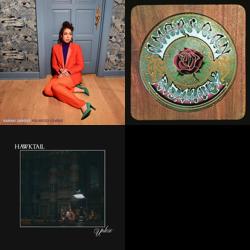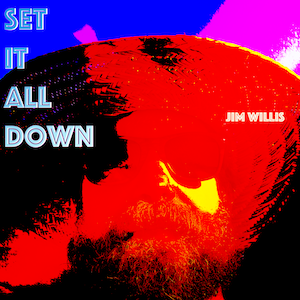Molly Tuttle
Molly Tuttle’s show was light years beyond anything that’s ever hit the main stage at Greyfox. Unlike most other artists, Tuttle and her band brought their own lights, equipment, and sound team. This initially seemed strange, given the festival’s typically excellent sound management. However, minutes into her Friday night show, it became clear why: the lights and processing effects used for her performance were amazing, strategically synced to specific moments in each song, adding a new dimension to her music.
Her band is incredible. Bronwyn Keith-Hynes on fiddle, Dominick Leslie on mandolin. Incredible lineup. Was very cool that halfway through the show they called onto stage the McCoury’s fiddle player, Jason Carter, to announce that he and Bronwyn are getting married. The two of them playing together was a real treat.
Just as I thought, “This is great but straying a but too far from traditional bluegrass,” Tuttle seamlessly transitioned to performing a string of songs with her band around a single mic at center stage, sans effects. This versatility showcased their ability to excel in both modern and traditional styles. Tuttle’s songwriting shines through, particularly in her masterpiece “Crooked Tree.” She is 100 times the musician/songwriter of Taylor Swift. Her candid discussion of her alopecia diagnosis, culminating in the removal of her wig, created a genuinely emotional experience for the audience.
Le Vent du Nord
Highlights: Quebec-based band, unique sound, exceptional musicianship
Le Vent du Nord from Quebec initially sounded bizarre on paper, but their performance on the Catskills stage was mind-blowing. Their act was unlike anything I have ever seen or heard before, featuring an extraordinary level of musicianship and a unique stage presence. The experience was so impactful that it would warrant immediate ticket purchases for any future performances in the area. More information about the band can be found at https://leventdunord.com/en/ I really do not know how to explain these guys so perhaps YouTube would be a good way to learn more about them.
Hawktail
Highlights: Trio formation, captivating live performance, “Chambergrass” genre
Hawktail, (once a quartet but MT’s mando player, Dominick Leslie) now a trio consisting of fiddle, guitar, and bass, delivered a super engaging performance at the intimate Creekside stage. Despite my preconceptions of their music being suitable for napping, their live act challenged this notion entirely. The power and emotion conveyed in their performance, coupled with their exceptional musicianship, interplay, and dynamics, made for a captivating experience. Watching them perform live was akin to witnessing six hands working in unison to construct a musical sculpture that materialized and vanished with each tune. I can not wait to see this band again. Here’s a good taste of the band (from last year with Leslie on mandolin) definitely watch all the way through to Brittney Haas’ killer fiddle solo at the end of the video.
Darol Anger and Bruce Molsky
Highlights: Experienced fiddle duo, memorable rendition of “I Wish I Knew How It Would Feel to Be Free”
This fiddle duo’s performance on the small Creekside stage was a delight to watch. Their music and the interplay between them reflected a long-standing musical relationship. Their rendition of “I Wish I Knew How It Would Feel to Be Free” was particularly infectious. As soon as i got home I learned the chord changes to this piece. Upon doing a further dive on this piece, I can not recommend enough watching Nina Simone’s heart-wrenching performance of the same song at the 1976 Montreux Jazz Festival.
Other Notable Performances
Twisted Pine offered a fun twist on Bluegrass/Americana (or “fringe Americana”) by incorporating a flute into their ensemble, making them worth checking out. Brennan Leigh was excellent to watch. She’s a gifted songwriter/storyteller. Travelin’ McCoury’s killed, as always. I don’t think there are higher caliber musicians playing anywhere in any genre of music.
The Sam Grisman Trio/Project delivered performances that lived up to the expectations set by Sam’s musical pedigree. Having grown up with Jerry Garcia playing in his basement, Sam showcased great musicianship and stellar song choices. His evening electric show with a drummer, where he played electric bass, provided a different but equally excellent vibe compared to his acoustic performances.
I saw a lot of other great bands but these stood out as highlights and are likely to inspire further exploration of their catalogs in the coming year.








